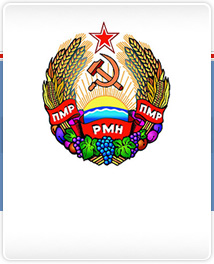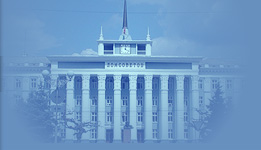Igor Smirnov: "We have a stronger case for statehood than Kosovo"
International recognition of Pridnestrovie's independence is among the new and emerging country's top priority, says its President, Igor Smirnov. Re-elected in a landslide in December 2006, the independence leader also explains that historically and under international law, his country's claim to statehood is much stronger than Kosovo's.
Igor Smirnov, 65, got re-elected in a landslide in December for a new term as President of Pridnestrovie. The former political prisoner and independence leader is one of the "fathers of the republic", having played a leading role in Pridnestrovie's declaration of independence, 2 September 1990. His own father was imprisoned by Stalin, and he himself launched his political career by facing off against the official candidate from the Communist Party of the Soviet Union in the first free elections under 'perestroika'. Later that year, he led Pridnestrovie to independence. Some say that he is to blame for the failure of the new and emerging country to achieve international diplomatic recognition over the past nearly 17 years. Others say that he has made it his life's work to ensure that Pridnestrovie will stay independent.
Hated in Chisinau, misunderstood in Brussels, and treated with ambivalence in Moscow, his personal popularity with local voters is high. In December 2006, facing three challengers, he was re-elected to the presidency for a third time in an election which observers and international journalists, who were present during the elections, declared free and fair.
On the other hand, international organizations who sent no observers and who were not present to oversee the election process, declared the vote unfree without having seen it.
Smirnov is in charge of a country with a population the same size of Montenegro, the latest member state to join the United Nations. But unlike Montenegro, which has access to international institutions and receives support from the international community, being the President of the Pridnestrovskaia Moldavskaia Respublica (PMR) is hard work: Shunned by the outside world, and with his country not even appearing on the map, Igor Smirnov has faced an uphill battle for the past seventeen years. He he talks about the challenges of running a country which has all the attributes of statehood but which for political reasons is still not integrated into the rest of Europe.
With Kosovo's proposed independence in the headlines, Smirnov explains how Pridnestrovie is already much more of a sovereign state than Kosovo, and how it has a better legal and historical support for its statehood.
Igor Smirnov, what is the main task for this presidential period?
" - International recognition of Pridnestrovie's independence and diplomatic relations with other countries. And actively informing the international public opinion about the reality, about what is in fact really going on here. In Pridnestrovie, many different ethnic groups reside. Moldovans, Russians, Ukrainian, Bulgarians, Jews. All of them freely went to the polls on 17 September 2006 to choose their own future. They voted in favor of strengthening the independence of Pridnestrovie and of seeking ties to Russia."
" - I need to point out that after the dissolution of the Soviet Union, we here in Pridnestrovie have already offered various forms of coexistence with the Republic of Moldova as part of a common state. But all these confederate, federal projects, and others plans, drafts, proposals and ideas, have been turned down one after another by the leaders in Chisinau. Even the Kozak Memorandum of 2003 was rejected by Moldova, even though we in theory had already accepted it.
So by now, let us be clear. Chisinau has chosen its own path, and we have been forced to choose another. Now, the task before us is to put the quality of life of our own citizens first. Listen to what they want, and carry out their wishes. And it is easy to see from the results of the independence referendum that they don't want Moldova."
Will the "Kosovo precedent" happen? Washington claims that Kosovo and Pridnestrovie are different...
" - Of course they are different. Look to international law, and look to the history of this land. Pridnestrovie has a much stronger legal and historical basis for recognized sovereignty than Kosovo. And economically, we currently trade with 94 countries [99, according to data from the PMR Chamber of Commerce, ed.]. We do not overestimate the impact of Kosovo resolution, but if the independence of Kosovo is recognized, then obviously that adds some more arrows to the quiver of our diplomats."
What is next for the unrecognized countries, like Pridnestrovie, Abkhazia, Nagorno-Karabakh, etc.?
" - First of all, I wouldn't call us unrecognized countries. The term increasingly used internationally is that we are de facto independent republics. To work on issues common to all, three of us established an international framework - the Community for Democracy and Human Rights - in June of 2006. It includes a Parliamentary Assembly and a permanent secretariat. This also led to Pridnestrovie opening an embassy in Abkhazia in December of 2006. I see an expansion of international relations as the next logical step."
And Russia's role?
" - In the summer of 1992, intervention by Russia to keep the two sides apart was enough to end the bloodshed and get Moldova to agree to a ceasefire. Since then, Russia has overseen that this ceasefire is respected by both sides. No one wants the war to flare up again. And Russia does not want earlier agreements to be violated, including the 1997 memorandum which gives Pridnestrovie the right to conduct foreign trade freely and independently of Moldova. Last year, in March, Moldova launched a customs blockade with Ukraine, and in response Russia helped Pridnestrovie with aid to avoid a humanitarian catastrophe. It is obvious that we would also like for Russia to recognize Pridnestrovie diplomatically. But we understand that we can only ask for this, we can not demand it."
In May 2006, Russia and PMR signed a cooperation and trade protocol, yet some of your products - such as Kvint brandy - have been denied access to Russian markets. Does that make sense?
" - Indeed, it is nonsense! With one hand, Russia provides aid to help us face the economic blockade and economic war which Moldova is waging against us. With the other hand, Russia bars entry of our products. I can not understand this, and I frequently bring it up. In Abkhazia, I got confirmation that Abkhazia is allowed to supply wine to Russia separate from Georgia."
Presidents Putin and Voronin met in late 2006 and since then, Moscow has easened its attitude to Moldova. Does this mean that Moldova will in return ease its attitude to Transnistria?
" - I was not been present at the meeting between Putin and Voronin. But I know one thing: The latter had nothing, and he was just bluffing. As I already said, Moldova turned its back on the 2003 Kozak Memorandum, broke the 1997 Primakov Memorandum, and basically violated all of our other negotiated arrangements. Even today, the Moldovan side still thinks that the smart thing to do is to keep up its longstanding policy of insults, coercion and economic blackmail against Pridnestrovie. Under such conditions, negotiations witin the old format are pointless. First, we need the mediator countries, Russia and Ukraine, to guarantee our long-established right to free trade. This was agreed upon in 1997 and has been respected by everyone involved until Moldova did an about-face in 2006. Next, we must work out the best way for Pridnestrovie and the Republic of Moldova to relate to each other, based on the wishes and desires of the inhabitants of both of the affected sides."
Moldova wants NATO troops to serve as peacekeepers in Pridnestrovie. Will that happen?
" - If you think that the United States is doing a good job of bringing peace to Afghanistan and Iraq, I beg to differ. A peacekeeping operating is only successful when it is agreed upon by both sides. Both. This is why here, in our case, we haven't had a single loss of life in more than fourteen years. 14. So there is absolutely no objective, logical reason why this very successful peacekeeping mission should be replaced by an unknown entity that at least one of the sides to the conflict is not in agreement with. This is a guarantee for instability and possible bloodshed, as much as we are all committed to nonviolence. And such an adventure is simply not in the interest of the people of Pridnestrovie, nor in the interest of the people of Moldova."
You can't stay on as President forever. Will your son Oleg succeed you? Or Vice President Alex Korolev?
" - This is not for me to decide. We have a dozen political parties in Pridnestrovie. Some of them will launch their presidential candidates. I have already declared that I am leaving the post of President as soon as we are internationally recognized as a sovereign state. Then someone else will take over, and that person will be whoever the people elect. You can write that."
06.03.2007




